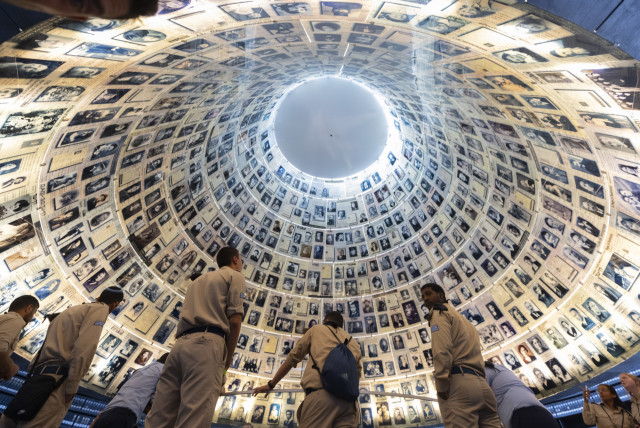Yad Vashem caught in Israeli political crossfire

NATIONAL AFFAIRS: These types of relationships between Israeli institutions and their sister organizations in the world are complex and have many times become ugly disputes.
There aren’t many organizations or institutions in Israel or in the Jewish world about which there is a positive consensus. One of these institutions is Yad Vashem – The World Holocaust Remembrance Center.
But this week, Yad Vashem got caught in the cross fire of both Israeli politics and inner organization rivalries in the Jewish world.
A week ago, there were reports that claimed Prime Minister Benjamin Netanyahu and his government, including Education Minister Yoav Kisch (Likud), made it clear they intend to remove Dani Dayan from his post as chairman of Yad Vashem. This ignited a firestorm of controversy.
Born in Argentina, Dayan is an entrepreneur, diplomat, and politician. He was Israel’s consul-general in New York in 2016 and became Yad Vashem’s chairman in August 2021. Notably, he advocated for Israeli settlements in Judea and Samaria and led the Yesha Council from 2007 to 2013.
After endorsing Netanyahu in 2013, Dayan became the Yesha Council’s chief foreign envoy, representing Israeli settlements globally. Following an ambassadorial dispute with Brazil, he was reassigned to New York. There, despite his political background, Dayan was a respected diplomat, gaining favor across Jewish organizations and actively engaging with US Hispanic communities.
This story occupied the Israeli media on and off all week. Representatives from the State Department and the European Union spoke out in favor of Dayan and asked to leave Yad Vashem out of political issues.
But on Wednesday, slowly the political aspect began to fade away. Dov Eichenwald, the CEO and publisher of Yedioth Books, has been appointed by the government as a board member at Yad Vashem. He stated that “Education Minister Yoav Kisch called to wish me well in my new role and asked that I reassure the management. Contrary to the rumors and sensationalism in the media, he has no intention of replacing the chairman of Yad Vashem.” Eichenwald added, “While there are certain matters that might need review, the institution of Yad Vashem will always stand above any controversy.”
Yad Vashem's dispute with its sister organization
At the same time, what the Jewish communities around the world were more interested in was Yad Vashem’s bad relations with its sister organization, the American Society for Yad Vashem. As reported by The Jerusalem Post this week, Yad Vashem terminated its long-established association with ASYV, with the controversy centering on the charge that the ASYV has not been adequately transferring donations meant for Yad Vashem’s programs and activities.
According to Yad Vashem, the ASYV’s “endowment” fund has swelled to over $80 million, yet only a mere $1m. has been relayed annually to the World Holocaust Remembrance Center.
Over the past year, Yad Vashem’s leadership informed its 500+ employees about impending layoffs and retirements, with some positions not being refilled. The staff was reduced by 20%, while the salaries of the remaining employees were supposed to be increased, something that hasn’t happened to date.
The ASYV is currently facing a contentious period with Dayan. It believes Dayan is undermining the autonomy of ASYV’s endowment, despite the fact that ASYV operates as an independent 501(c)(3) organization in the US, with its funds strictly regulated under American law.
A deep dive into the financial contributions of ASYV to Yad Vashem reveals significant support over the years. On average, the organization has funneled $17.5m. annually over the past three years, $15.18m. over the last five years, and $13.33m. on average for the past 15 years. This amounts to a whopping $200m. sent to Yad Vashem in the last decade and a half alone.
Endowments, like the one ASYV maintains are commonly used and recognized as a prudent strategy for providing sustained support to institutions. Several “American Friends of” organizations have established sizable endowments, such as the American Committee for the Weizmann Institute of Science with $567m., and the American Friends of Hebrew University with $649m.
Members of ASYV usually boast that they hold a four-star Charity Navigator rating, the highest attainable, symbolizing what they see as their dedication to efficiency, transparency, and effective governance.
However, the current climate indicates a rift in the relationship. Many ASYV members feel that Dayan is largely focused on short-term, self-serving initiatives, often seeking immediate recognition through photo opportunities. They argue that ASYV, an institution established and managed by Holocaust survivors and their descendants, has dedicated 43 years to building and supporting Yad Vashem. The ongoing situation, where Dayan seems to act on his personal agenda, is causing distress and alarm among the community.
In an email from Tzvika Fayirizen, CEO of Yad Vashem, on August 29 to ASYV, he announced the termination of the ASYV license to use the trademark “YAD VASHEM,” effective from January 1, 2024. After this date, according to Dayan, ASYV should not suggest any affiliation or representation that it raises funds for Yad Vashem.
The letter further states that Dayan claims ASYV has over $80m. referred to as an “endowment.” Fayirizen suggested these funds should be transferred to Yad Vashem, as they were intended for its support.
“Our understanding is that the American Society for Yad Vashem currently holds in excess of $80m.... All of these funds were donated or gifted to the American Society for Yad Vashem with the express or implied intent to support Yad Vashem,” Fayirizen said in the email, adding: “This transfer will allow us to ensure that these resources are utilized effectively, and will honor the expectations and satisfy the intentions of those who have generously made donations”
In a response email, the cochairmen of ASYV, Adina Burian and Mark Moskowitz, responded to Fayirizen’s previous letter. They emphasized the existence of “factual inaccuracies” in Fayirizen’s claims and his decision to disaffiliate with ASYV. The cochairmen mentioned that they had advised Fayirizen and Dayan to reconsider, and also informed of their disaffiliation is a complex process. They reassured that funds would continue to be managed as per the donors’ expectations.
The cochairmen of ASYV, in response to previous letters from Yad Vashem, mentioned that they found what they see as “legal threats and demands” to be “inappropriate and unproductive.”
“This is no way to communicate with our organization,” they added. They affirmed their commitment to operating ASYV in line with legal obligations and donors’ expectations. They also emphasized the need for internal evaluations regarding disaffiliation consequences, if Yad Vashem continues on its current path.
Dayan wrote a long and emotional email to ASYV in August, explaining the dramatic financial deficit that Yad Vashem was in, even before he joined as chairman. The COVID-19 pandemic; the huge decline in donations from Russian-speaking Jews, due to the war in Ukraine; and other issues led to the layoffs of about 100 employees.
“It was incredibly frustrating and frankly eye-opening to observe that even when those extreme challenges faced by Yad Vashem were duly communicated to your executive leadership, the reciprocal support that should inherently emanate from a partnership was regrettably absent on the side of the ASYD,” Dayan wrote.
He added that Yad Vashem was granted no more than 2%-3% “of the funds that AFYS holds.” Dayan claimed that “the sum allocated to Yad Vashem’s existential needs was most probably a fraction of the portfolio’s return in 2021,” and that “we survived, despite that breach of faith and trust, but only thanks to being bailed out by the Israeli government.
“If the AFYD believed [that] in our times of crisis, it should retain funds allocated for Yad Vashem, and see how much money can first be squeezed out of the Israeli government, then the AFYV is simply no partner of ours.”
“This dispute is not a recent development but, rather, one that Yad Vashem has been addressing for several years, predating Dani Dayan’s chairmanship. It is important to note that this decision is not a personal one made by Dani Dayan, but rather the result of deliberations within the Yad Vashem Directorate. The directorate, driven by their long-term vision and understanding of the philanthropic challenges and trends we are currently facing and will continue to face in the coming years as the number of Holocaust survivors dwindles, has decided to take this step, especially in preparation for the upcoming decade.
“Just yesterday, Yad Vashem’s Directorate unanimously reaffirmed their previous decision from July 30, 2023, regarding the American Society for Yad Vashem. This decision followed extensive deliberation and a protracted period of attempts by Yad Vashem to reach agreements with the American Society for Yad Vashem.”
These types of relationships between Israeli institutions and their sister organizations in the world are complex and have many times become ugly disputes. They usually are a result of power struggles and influence, but mainly, a lot of money. These situations can also be a result of a lack of understanding and culture between Israelis and American Jews.
Jerusalem Post Store
`; document.getElementById("linkPremium").innerHTML = cont; var divWithLink = document.getElementById("premium-link"); if (divWithLink !== null && divWithLink !== 'undefined') { divWithLink.style.border = "solid 1px #cb0f3e"; divWithLink.style.textAlign = "center"; divWithLink.style.marginBottom = "15px"; divWithLink.style.marginTop = "15px"; divWithLink.style.width = "100%"; divWithLink.style.backgroundColor = "#122952"; divWithLink.style.color = "#ffffff"; divWithLink.style.lineHeight = "1.5"; } } (function (v, i) { });

